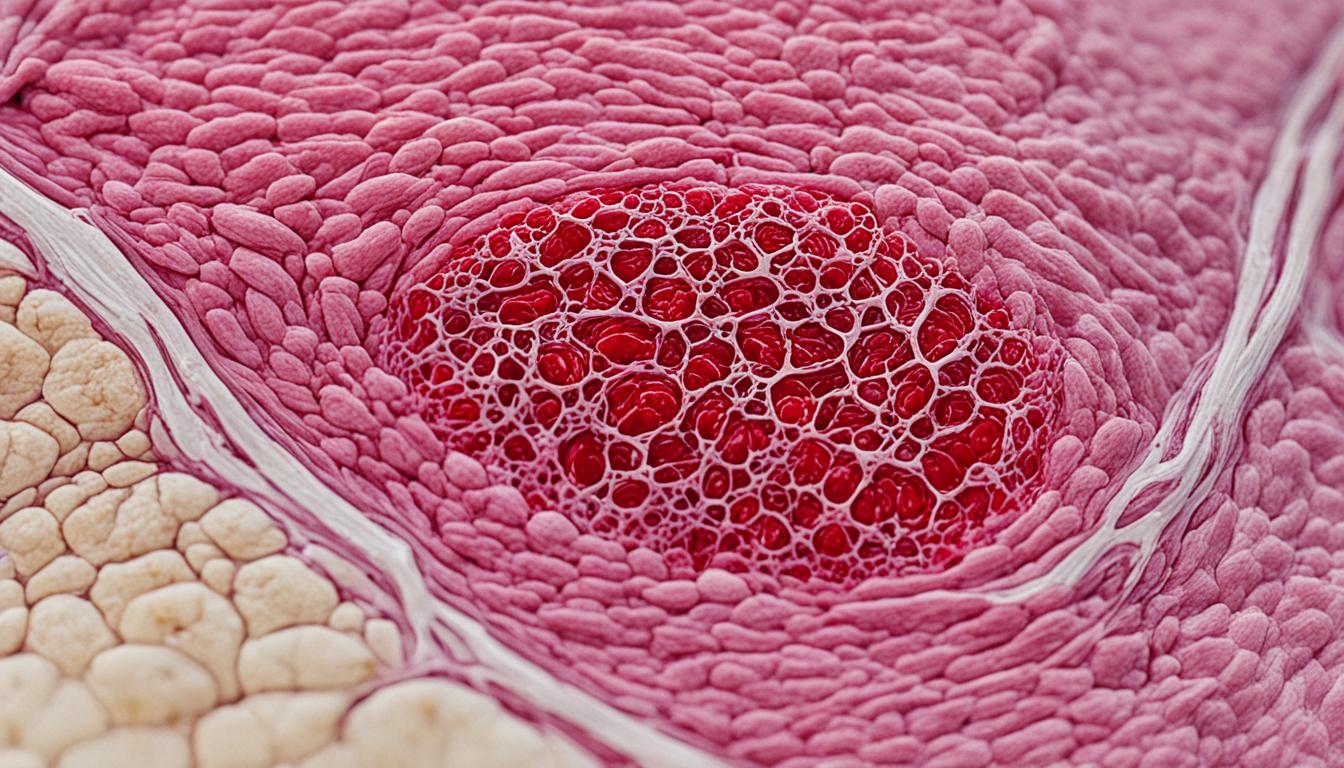Swollen lymph nodes are small glands that help filter lymph, a clear body fluid. They can swell up when your body is fighting off an infection or dealing with other issues like cancer. A person with an infection might notice swollen lymph nodes under their neck, in their armpits, jaw, or near their groin. This swelling is often a sign your body is working hard to fight off an illness. But sometimes, it could mean something more serious, like cancer.
Doctors might use a few ways to figure out why your lymph nodes are swollen. This can include checking you over, drawing blood, and taking pictures with special machines like X-rays or MRIs. The treatment for swollen lymph nodes varies depending on what’s causing it. It could involve taking medications, antibiotics, or in some cases, being treated with stem cell therapy.
Key Takeaways:
- Swollen lymph nodes are glands that get bigger when your body is fighting an infection or dealing with cancer.
- Signs of an infection could be swollen lymph nodes in your neck, armpits, jaw, or groin.
- While swollen lymph nodes often show your body is battling an illness, they can also point to something more serious.
- Doctors have several methods to find out why your lymph nodes are swollen, including exams and tests.
- The treatment for swollen lymph nodes depends on the cause. It might include medicine or, for some cases, stem cell therapy.
Symptoms of Swollen Lymph Nodes
Swollen lymph nodes have many symptoms that give clues about the problem. The main sign is finding bigger, tender lymph nodes in the neck, armpit, jaw, or groin. These can feel like lumps under the skin.
Other signs might also show up. For example:
- Coughing: If you cough a lot, it could mean a breathing issue linked to the swollen nodes.
- Fatigue: Being very tired could point to an infection or sickness that’s affecting the lymph nodes.
- Fever: An infection often makes the body warmer and might cause the lymph nodes to swell.
- Chills: Feeling very cold at once might mean there’s an infection or inflammation in your body.
- Runny nose: A nose that keeps running can be another sign, especially if your neck lymph nodes are swollen.
- Sweating: If you sweat a lot at night, it could be from various issues that cause lymph nodes to swell.
- Pain when walking or bending (swollen lymph nodes in groin): Groin lymph nodes can hurt when you walk or bend if they’re swollen.
If these signs show up with your swollen lymph nodes, see a doctor. They can help figure out the problem and how to treat it. It could be an infection needing antibiotics or a more serious condition like cancer or an immune disease.
| Common Symptoms of Swollen Lymph Nodes: |
|---|
| Enlargement and tenderness of lymph nodes in the neck, armpit, jaw, or groin |
| Coughing |
| Fatigue |
| Fever |
| Chills |
| Runny nose |
| Sweating |
| Pain when walking or bending (swollen lymph nodes in groin) |
Causes and Diagnosis of Swollen Lymph Nodes
Swollen lymph nodes may happen due to several reasons. These include common infections and more severe issues like cancer or autoimmune diseases.
Infections causing swollen lymph nodes
Infections such as the cold, flu, and strep throat can make lymph nodes swell. So can mononucleosis, or even a tooth infection. STIs like syphilis or gonorrhea may cause groin lymph nodes to swell.
Cancer causing swollen lymph nodes
Lymphoma, leukemia, and breast cancer are some cancers that may make lymph nodes big. Cancer cells can travel to the lymph nodes, causing them to swell.
Autoimmune conditions causing swollen lymph nodes
Autoimmune conditions can also be a cause. Diseases like lupus or rheumatoid arthritis make the immune system attack the body. This can cause swollen lymph nodes.
Doctors start diagnosing swollen lymph nodes by examining the patient. They check how large, painful, or hard the nodes are. This gives them hints about what might be wrong.
Further tests might be necessary. These may include blood work, imaging scans, and sometimes a lymph node biopsy. These tests provide detailed information that helps in diagnosing the issue.
- Blood tests can show specifics about any infections or diseases causing the swelling.
- Imaging tests help get detailed pictures that show the lymph nodes and the tissues around them.
- A lymph node biopsy involves taking a small sample of the node to check for any abnormal cells. This helps in giving a precise diagnosis.
With careful assessment and the right tests, doctors can pinpoint the reason for swollen lymph nodes. So, they can come up with the best treatment plan for each patient.
Stem Cell Therapy for Swollen Lymph Nodes
Stem cell therapy is a new way to treat swollen lymph nodes. This happens because of certain diseases. In Thailand, experts like Dr. Udomsak Bunworasate are leading in these treatments. They specialize in internal medicine, cancer, and blood diseases. They use stem cells to help people with blood cancers.
This therapy uses stem cells to fix damaged tissues. It can help with swollen lymph nodes from cancer, autoimmune diseases, and more.
It can boost tissue repair and health. If your lymph nodes stay swollen, seeing a stem cell therapy specialist is a good idea. They can check if this new therapy might help you.

